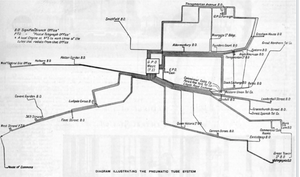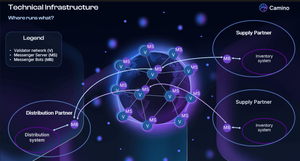Camino Messenger is an efficient travel data management and exchange system built on Camino Network for instant communication between providers and distributors.
Imagine baking a cake with a recipe that measures ingredients in metric and imperial units: a dozen eggs, three pounds of milk, and five kilos of butter. Despite the vast number of digital technologies available today, this metaphor reflects the daily routine of travel service providers and distributors. Even though any technology's primary purpose is “to meet a human need or solve a human problem,” unfortunately, it got lost in the maze of APIs and complex puzzles businesses must assemble.
At Chain4Travel, we clearly see that the future of travel is in simplified connections, the unified data standard, and flexibility — when, with fewer technologies, you can achieve more results.
Camino Messenger is a concept with a long history. Its first ancestor was the tin can telephone.
Imagine two ladies in the 17th century connecting through a simple yet ingenious device: the tin can telephone. They take two empty cans, tie them together with a string, and thanks to waves transmitted through the string, they can communicate over a distance.

Human’s desire to communicate securely in the distance resulted in the second ancestor of Camino Messenger — the pneumatic tube. Messages were sent through tubes with compressed air in iron capsules through pre-programmed routes. It was a perfect technology for institutions from the middle of the 19th century until today. Today, such systems mainly serve niche applications of speed and security for items that cannot be sent electronically; for example, casinos use it for cash transfers.

One hundred years later, in the 21st century, we continue to build infrastructure for instant and secure communication, but now in the digital space. The Internet has connected the world like never before, first with texts and pictures and later with videos and live streams at scale.
On the flip side, this global interconnectivity brought new challenges, particularly the security and authenticity of data in the digital space. Businesses started to build systems and connect via APIs to verify and protect sensitive data. Today, there are a lot of APIs, and they work on different data standards.
Just like in a pneumatic tube mechanism, a sender and a receiver are connected literally with a pipe. If they want to have another “partner” in the pipeline, this means building two more pipes (APIs) from each to the new “partner.”
With the speed of globalization, the number of API connections for travel service providers and distributors has scaled. Companies now need to work more to maintain the existing structures and frameworks, which leads to the lack of resources to provide travelers with human service and hospitality. Armies of developers work daily to support the existing API systems. Agreements with new partners take months, and after a travel service is delivered, there is yet another set of systems to create an invoice, make payments, and consolidate them into the outstanding invoices.


Instead of physical capsules and pneumatic tubes, imagine Camino Messenger as a virtual tube system for your business transactions and communications. In this digital version, your "messages" (which could be bookings, payments, or any other data) are packaged into digital "capsules" and sent directly to another company's "inbox" through a secure, instantaneous network.
Think of Camino Network as a digital version of the pneumatic tube system, where instead of iron capsules flying through tubes, travel data encrypted and packed in clear message types according to the unified standard floats around the global digital network.
To access the system, you need to have a wallet, which can be viewed as an “account”. For the sake of security and trust, every “account” willing to communicate through Camino Messenger has to be verified with IDs or company information. Hence, this system of communication is called wallet-to-wallet.
Camino Messenger facilitates immediate, wallet-to-wallet communication between travel service providers and distributors. Therefore, this means that when a travel service provider updates a service, launches a new offer, or changes their offerings, this information can be instantly shared with their partners and distributors through the messenger.
Now, distributors can instantly communicate their needs, place orders, or share feedback with travel service suppliers with the help of the messenger and avoid delays that are very common in traditional communication methods like emails, phone calls, or the manual integration of updates through APIs or a paper-based contract.
Camino Messenger merges what today requires at least two separate API interactions for bookings and payments into a single transaction, making the process fast and instantly reversible.
In the conventional online booking process, thousands of digital requests are exchanged between different systems before making a single booking. This includes availability checks, price comparisons, booking requests, confirmations, and payment processing. Such an inefficient communication system generates unnecessary network traffic and requires data storage.
Camino Messenger facilitates direct and targeted communication with service providers through messaging types and the global travel standard. The design of the messenger helps to exchange volatile information in a light, fast, and secure manner to and from service providers. This approach significantly reduces the number of unnecessary requests, lowering the computation and the amount of processed and stored data.
As Camino Messenger and the underlying blockchain infrastructure are multifunctional technologies that cover many processes, from payments and settlements to data management and distribution, it is essential to understand the most effective use case for your particular business.
For this reason, we have prepared a table with unique value propositions tailored to different target audiences. Please keep in mind that Camino Messenger is still in the Alpha version (as of Feb 29, 2024). More features and use cases will be added as more companies join.
| Camino Messenger Feature | Target Audience | UVP is the unique feature or benefit that sets a product or service apart from its competitors |
|---|---|---|
| ⚡️ Fast partner connectivity | Travel service providers (🛵) | Connect once, instantly, and securely to new, verified partners in a wallet-to-wallet manner worldwide to reach more customers in new markets. |
| Travel service distributors (📊) | Connect instantly to the global network of travel service providers, from major airlines to local tour guides, and expand the product portfolio to provide more personalized offers to your customers and meet market demands. | |
| 💸 Micro Payments | Travel service providers (🛵) | Transform your pricing model with the flexibility of micropayments to find new revenue streams. |
| Travel service distributors (📊) | Improve your cash flow and build new revenue streams with bundles of customized travel services managed through immediate and cost-effective micropayments. | |
| ☕️ Micro Services | Travel service providers (🛵) | Differentiate your products with unique extras that set you apart from competitors through diverse, value-added services. |
| Travel service distributors (📊) | Retain customers, increase their loyalty to your brand, and provide unique user experiences with special perks and extra services that are easy to add to standard packages. | |
| 🧠 Digital sustainability | Travel service providers (🛵) | Thanks to efficient digital data management and streamlined processes, shift your focus from technologies to paying more attention to travelers’ unique experiences. |
| Travel service distributors (📊) | Sustain your digital space and relocate resources to explore new business models in the era of connected consumer behavior. |
| Target Audience | UVP is the unique feature or benefit that sets a product or service apart from its competitor's |
|---|---|
| Tech (🛠) | Cut APIs immensely to free developers to create innovative solutions. |
| Operations (⚖️) | Simplify and secure agreements to automate settlement processes in a compliant digital space, ensuring every transaction is safe and verified. |
| Marketing (💁♀️) | Reestablish your brand as an innovator in travel tech and engage with the web3 travel community to craft data-driven marketing strategies at scale and new pricing models with microservices and micropayments. |
| C-levels (🔭) | Explore the future of travel data management and distribution to save costs, automate your operations, and align your vision with the emerging digital era of connected consumer behavior. |
Today, a tour operator managing multiple destinations has to deal with a web of APIs from various suppliers. Let’s take two countries: Italy and Austria. In Austria, they deal with numerous accommodation providers, each requiring separate API integration. Italy compounds the complexity with more accommodation suppliers and some extra for transfers across different regions, each using various data formats (XML, JSON, CSV) and field names for the same type of information.
Such a diversity of tech leads to errors in data translations and requires a lot of manual work to process API calls for each supplier, making the low-margin travel business inefficiencies.
Transitioning to Camino Messenger simplifies this process dramatically. Instead of operating on numerous APIs with diverse formats and terminologies, tour operators and their suppliers can utilize the unified travel data standard using the same data format, fields, and values across the board. This also extends to payment systems establishing new transparent frameworks helping partners to deal with immediate and postponed payments clearly and to avoid the existing risks of invoicing errors and disputes over service quality or booking details.
Camino Messenger, just like the entire ecosystem of Camino Network, embodies a collaborative vision for the future of travel. It is an open-source product driven by the community of travel-related companies, which makes it clear that all the frameworks and tools are finely tuned to the needs of the entire industry.
The Alpha version provides the basic "ingredients" necessary for crafting basic travel packages. These ingredients are message types, accommodation, transportation, and activity. Think of a picture, video, location, or voice message you send daily through WhatsApp. The Accommodation MessageType is for trading hotel rooms and holiday homes, the Activity MessageType is for tickets and excursions, and the Transport MessageType is for flights, trains, and transfers.
These three are the solid foundation with upcoming vehicle message type (for bicycle, motorbike, car rental, camper rental) packages, and upselling after booking, which are in the definition phase with partners.
However, the true potential of Camino Messenger unfolds as more companies join the network, each contributing their unique "flavors" to the mix of message types. It is a unique opportunity to establish your brand among the innovating travel tech community and build new partnerships with over 170 companies and startups from all over the world representing most of the travel verticals.
With the growing diversity of message types, companies working in Camino Network will "bake" highly personalized travel experiences at scale, following the trend for personalization and catering to the tastes of today's travelers. It is a whole new paradigm, where a custom travel itinerary is as straightforward as following a single, unified recipe. But even more exciting is that with Camino Messenger, the most innovative companies can finally explore new digital technologies tuned to their needs, conduct experiments, and launch new groundbreaking business models.
Depending on your experience and main domain, we prepared 5 "call to action" links to make the process personalized (with Camino Messenger it will be much easier). Please check the corresponding link and get in touch with our team for any questions you have regarding Camino Messenger.